Oklahoma’s 2016 deer hunting season is well on its way to rearranging the record book. Already the second-place spot on the list of Oklahoma’s all-time biggest bucks has changed twice, and official scoring has only been going on for a few weeks.
As the big racks continue to pile up, could this be the year that a new all-time record takes its place atop the list?
Alan Peoples, chief of wildlife with the Oklahoma Department of Wildlife Conservation, said the scores being seen now are from archery season harvests. This is because of the 60-day drying period that is required before a set of antlers can officially be scored. “As the weeks go by, we are going to start seeing the scores for the deer that were taken during gun season, and there’s no telling what those guys were able to do,” Peoples said.
“I have the privilege of seeing a bunch of big deer racks pass through my office every year, and I’ve never seen this many at one time,” Peoples said.
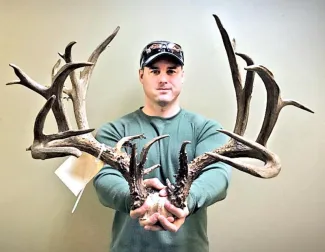
Travis Ocker of Lawton holds the nontypical rack that scored 245 2/8, putting him in the third-place overall whitetail spot in the Cy Curtis Awards Program. (PROVIDED BY GEORGE MOORE)
BIG DEER THIS YEAR
Oklahoma’s overall first-place buck with a score of 248 6/8, taken in Tillman County by Michael Crossland of Grandfield during the 2004 gun season, remains safe so far. Just barely. As of Jan. 30, 2017, two notable trophy bucks from the 2016 season have come within inches of the top spot. Those are:
- Nontypical whitetail from Cleveland County, taken by Jeffrey Parker of Moore, score 245 5/8, 16-by-21 points on a 4-by-4 mainframe, second-place Cy Curtis Awards, highest-scoring archery buck in Cy Curtis history.
- Nontypical whitetail from Comanche County, taken by Jeff Ocker of Lawton, score 245 2/8, 19-by-9 points on a 5-by-5 mainframe, overall third-place Cy Curtis Awards.
At least four more racks scoring in the 190s and 180s were certified this past week at the Wildlife Department, all of which would qualify for Oklahoma’s Cy Curtis Awards and for the Boone & Crockett Club’s national registry of trophy whitetails.

MANAGING FOR SUCCESS
So why are so many remarkable trophy bucks emerging from this past season? A big part of the reason can be attributed to the Wildlife Department’s deer herd management strategy in recent years.
“The Department revamped the ‘Hunters in the know take a doe' slogan from 2000 and began emphasizing the message of ‘Hunters in the know … let young bucks grow!’ in 2013. The goal was to get hunters to think like deer managers and to realize that whenever they pull the trigger or release an arrow, that’s going to have an effect on their local deer herd,” said Erik Bartholomew, a big-game biologist with the Wildlife Department.
The management strategy urged voluntary restraint in harvesting younger bucks, allowing hunters to self-regulate for the benefit of the state’s deer herd, he said. “Without changing any regulations, our hunters were able to operate within the existing bag limits but still make their own harvest choices in the field. And those hunters who wanted to fill their freezer could still do so with our liberal antlerless harvest limits.
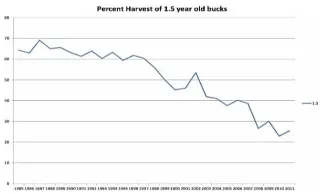
"This strategy benefited hunters and ODWC with a flexible plan that is working very well,” Bartholomew said.
As part of this educational effort, the Department released an informational poster to help hunters recognize a younger buck vs. an older buck. This deer management strategy drew nationwide attention when the Quality Deer Management Association named Oklahoma's Wildlife Department its 2014 Agency of the Year in recognition of innovative and positive deer management techniques through hunter education.
From a biological standpoint, the severe drought from 2011-13 reduced deer populations statewide, Bartholomew said. When the drought subsided, the habitat recovered much more quickly than the deer population, “meaning plenty of groceries for deer to eat.” Well-timed rainfall in the summers of 2014-16 coupled with mild winters and a “Booner” acorn year in 2015 created a very healthy deer herd in spring 2016.
“As a result, with deer being in good shape and another huge rainfall event in early spring and summer, our deer again had plenty of forage. As a result, mature bucks had everything they needed to potentially grow great antlers in 2016, and it is showing now,” he said.
“The Wildlife Department’s timing with its deer hunter awareness campaign and consistent harvest regulations, along with the drought and subsequent recovery, has really led Oklahoma to be a great state to harvest a great buck.”
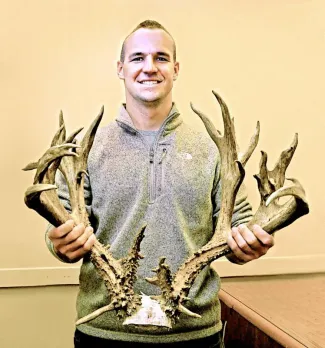
Jeffrey Parker of Moore holds the nontypical rack that scored 245 5/8, putting him in the second-place overall whitetail spot in the Cy Curtis Awards Program. (DON P. BROWN / ODWC)
A RUN FOR THE TOP
Parker, 28, agrees with the biologists’ assessment that the deer herd has been experiencing health gains in the past three years, which has translated into more hunting success.
“I’m not a trophy hunter. I eat venison, and so does my family, all year until we run out,” Parker said. But he also understands and supports the Wildlife Department’s “Hunters in the know … let young bucks grow!” educational campaign.
“I hunted a lot of public lands. People out there, anything that moves they shoot,” he said. “But you all have been posting so many things making everybody aware of the benefit of trophy hunting, that’s what I do on my small area. We let the young bucks grow, and if it’s not a 4 and a half-year-old deer, we don’t take it.
“I think it’s awesome because then you get a bigger deer … and more publicity, which is growing more people toward the sport, and you also get a deer with a lot more meat on it.”
Shortly after his harvest, Parker thought his deer might contend for the top archery spot in the Cy Curtis Awards. At that time, the highest-scoring non-typical buck taken during archery season had a score of 232 4/8. But in mid January, Parker heard the news that Ocker had turned in a score of 245 2/8. Thinking his score wouldn’t be close to Ocker’s, Parker resigned himself to the notion that his deer might end up in second-place for archery kills.
After a panel of official scorers finished examining Parker’s trophy set of antlers, the call was made to give him the news: His buck had indeed taken first place among all archery harvests, squeaking by Ocker’s rack by just 3/8 of an inch!
When told the score, “I really thought he was messing with me.” But after some reassurance, Parker’s doubt turned into exhilaration. Not only had his buck taken the second-place spot of all Cy Curtis whitetails, but it missed the all-time state record by just 3 1/8 points!
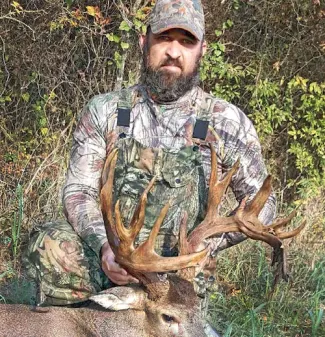
RIGHT: Darrell Boyd of Gerty harvested this giant nontypical buck during the 2016-17 archery season. The rack scored 204 1/8, which is eligible for listing in the Cy Curtis Awards, Boone & Crockett and Pope & Young registries. (PROVIDED BY DARRELL BOYD)
AWARD-WINNING SEASON
So far for the 2016 deer season, nearly 40 bucks have been added to the Wildlife Department’s Cy Curtis Awards Program. The program began in 1972 to recognize trophy game hunters in Oklahoma who harvest big game that meets the minimum qualifying score. Cy Curtis Awards are offered for white-tailed and mule deer, elk, pronghorn and black bear.
Hundreds of hunters will qualify for the Cy Curtis listings after the 2016 deer season. One of those is Darrell Boyd of Gerty in Hughes County. Boyd, 40, said he’s hunted his whole life and has taken plenty of big deer, “but not quite so big as they are now.”
Boyd said he’s never had any of his deer racks scored before, but he decided his two bucks for 2016 should be measured. Because of that, his name will now appear in the Boone & Crockett registry. Both bucks are nontypicals with scores of 204 1/8 and 179 7/8.
“This year, I didn’t have time for any feeding or cameras ... and I enjoyed it greatly,” he said.
While he said he doesn’t hunt for trophy bucks, he said any hunter likes the thought of taking a big deer. “It goes back to being selective as to what you are going to shoot. Don’t shoot the first thing that walks by.” On just one day this past season, Boyd said he saw 17 bucks but decided to pass on all of them. Because he refrained, he ended up with the buck listed among the top 50 in the Cy Curtis Awards.
Cy Curtis qualifying scores are 135 for typical deer and 150 for nontypical deer. For more information about how to apply, go online to www.wildlifedepartment.com and search for “Cy Curtis.”
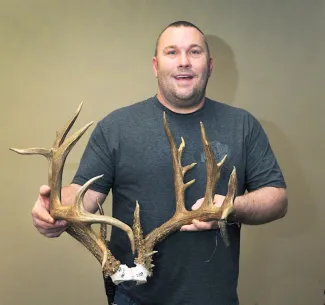
Kenneth Patterson of Moore holds the nontypical rack that scored 195 0/8, which he took during the 2016 muzzleloader season. He is eligible for listing in the Cy Curtis Awards Program and Boone & Crockett registry. (DON P. BROWN / ODWC)
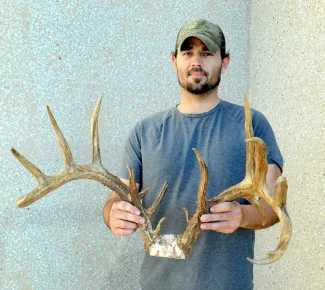
Mark Hurley of Norman holds the nontypical rack that scored 182 2/8, which he took during the 2016-17 archery season. He is eligible for listing in the Cy Curtis Awards Program and Pope & Young registry. (DON P. BROWN / ODWC)